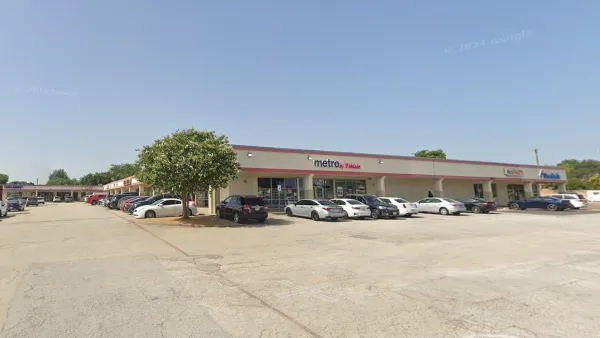The former ConocoPhillips campus, built as a self-sufficient complex complete with a lagoon and fitness center, will be repurposed into a mixed-use waterfront development.

A 63-acre former corporate campus in Houston will be redeveloped into a mixed-use project, reports Trevor Schillaci in the Architect’s Newspaper. “The effort will add new office space, residential, retail, and restaurants around the perimeter of the site.”
The original office park, built for Conoco (later ConocoPhillips) in 1984, “comprises 16 buildings arranged in five groups, with an additional service structure situated at the center of the complex.” Designed as a ‘technoburb,’ the complex aimed to provide everything workers needed: “While much of the complex is programmed as office (and garden) space, the central service building combines parking facilities, a gym, a computer center, staff cafeterias, a credit union, and a travel agency under one roof.”
“Recognizing that a post-pandemic workforce prefers low-rise, low-density workspaces, as opposed to the high-density office towers, the plan proposed by Midway reduces the original 1.3 million-square-foot site down to 650,000 square feet, while repurposing the remaining space to accommodate other uses,” Schillaci explains. Buildings will be remodeled into apartment units, a boutique hotel, as well as restaurants and bars with waterfront views. The developer plans to build on the complex’s sustainability elements by preserving on-site trees and green space and repurposing food and water waste. With demand for physical offices remaining low and the shift to remote work lasting longer than many predicted, adaptive reuse is gaining momentum as property owners look to new uses for now-obsolete office space.
FULL STORY: Midway announces redevelopment of Kevin Roche–designed ConocoPhillips office park in Houston

Maui's Vacation Rental Debate Turns Ugly
Verbal attacks, misinformation campaigns and fistfights plague a high-stakes debate to convert thousands of vacation rentals into long-term housing.

Planetizen Federal Action Tracker
A weekly monitor of how Trump’s orders and actions are impacting planners and planning in America.

Chicago’s Ghost Rails
Just beneath the surface of the modern city lie the remnants of its expansive early 20th-century streetcar system.

Bend, Oregon Zoning Reforms Prioritize Small-Scale Housing
The city altered its zoning code to allow multi-family housing and eliminated parking mandates citywide.

Amtrak Cutting Jobs, Funding to High-Speed Rail
The agency plans to cut 10 percent of its workforce and has confirmed it will not fund new high-speed rail projects.

LA Denies Basic Services to Unhoused Residents
The city has repeatedly failed to respond to requests for trash pickup at encampment sites, and eliminated a program that provided mobile showers and toilets.
Urban Design for Planners 1: Software Tools
This six-course series explores essential urban design concepts using open source software and equips planners with the tools they need to participate fully in the urban design process.
Planning for Universal Design
Learn the tools for implementing Universal Design in planning regulations.
planning NEXT
Appalachian Highlands Housing Partners
Mpact (founded as Rail~Volution)
City of Camden Redevelopment Agency
City of Astoria
City of Portland
City of Laramie





























